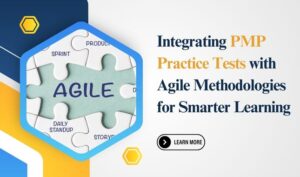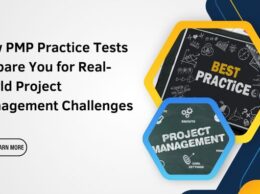Introduction
If you are pursuing for PMP certification mastering tools and techniques is no longer optional—it’s essential. The blend of traditional project management, epitomized by PMP (Project Management Professional) certification, with Agile methodologies is transforming how professionals approach problem-solving, stakeholder management, and project delivery. One of the smartest strategies for PMP aspirants is integrating PMP practice tests with Agile principles to build a deeper understanding of project dynamics. Let’s explore how this powerful combination can redefine your learning journey.
The Importance of PMP Certification and Practice Tests
The PMP certification remains one of the most sought-after credentials in the project management domain. Its rigorous curriculum challenges candidates on predictive, agile, and hybrid methodologies, preparing them for a variety of real-world scenarios. However, passing the PMP exam isn’t easy—it requires thorough preparation, including practice tests that simulate exam conditions.
PMP practice tests are not just about recalling facts; they’re about applying knowledge in scenarios that mimic real projects. They assess your grasp of processes, tools, and decision-making frameworks. But what if you could add an Agile twist to this preparation? Agile methodologies emphasize adaptability, collaboration, and incremental improvement—all of which are valuable in mastering PMP concepts.
Agile Methodologies: A Natural Fit for Learning
Agile is all about iterative learning and feedback loops. By incorporating Agile principles into your PMP study routine, you create a dynamic environment for smarter learning. Agile’s core values—prioritizing individuals over processes, responding to change, and delivering incremental value—align perfectly with the iterative nature of practice tests.
Here’s how Agile can reshape your PMP preparation:
- Scrum for Study Management
Divide your PMP syllabus into sprints (short, focused study intervals). Treat each sprint as a mini-project, complete with specific objectives (e.g., mastering risk management or earned value analysis). At the end of each sprint, review your progress and refine your strategy for the next. - Kanban for Progress Tracking
Use a Kanban board to visualize your study progress. Create columns like To Study, In Progress, and Completed. This not only keeps you organized but also motivates you as you see tasks moving across the board. - Daily Stand-Ups for Accountability
Dedicate five minutes daily to assess your progress. Ask yourself: What did I achieve yesterday? What will I tackle today? What challenges am I facing? This Agile-inspired reflection keeps you focused and proactive. - Feedback Loops with Practice Tests
After each practice test, analyze your performance. Identify weak areas, revisit the material, and retest. This iterative process mirrors Agile’s inspect-and-adapt philosophy, ensuring continuous improvement.
Benefits of Combining PMP Practice Tests with Agile
- Enhanced Adaptability
Agile trains you to respond to changing project conditions. Similarly, PMP practice tests help you adapt to diverse question formats, from situational problems to calculations. - Faster Feedback
Agile promotes immediate feedback. When integrated with practice tests, this means identifying errors and addressing them promptly rather than waiting until the final exam. - Team Collaboration Skills
Agile fosters teamwork and communication. While PMP prep is often individual, joining study groups can simulate Agile team dynamics, encouraging knowledge sharing and collective problem-solving. - Focus on Value-Driven Learning
Agile emphasizes delivering value. For PMP aspirants, this means focusing on high-impact topics first, ensuring maximum return on study time. - Stress Reduction Through Iteration
Breaking your preparation into manageable chunks reduces the stress of cramming. Each practice test becomes a milestone, not a burden.
Real-Life Example: Learning from the Trenches
One of my friend is a project manager preparing for her PMP exam. Initially overwhelmed, she adopted an Agile approach. She created a Kanban board to track her syllabus, joined a study group for daily check-ins, and set bi-weekly sprints to tackle specific knowledge areas. Using PMP practice tests as her feedback tool, she improved incrementally. By exam day, Sarah was confident and well-prepared, thanks to her Agile-inspired routine.
FAQs
What are PMP practice tests?
PMP practice tests are mock exams that simulate the actual PMP test environment. They help candidates assess their knowledge and readiness.
How can Agile methodologies improve PMP preparation?
Agile emphasizes adaptability, iterative learning, and collaboration, all of which enhance the effectiveness of PMP practice tests.
Is Agile knowledge mandatory for the PMP exam?
Yes, the PMP exam now includes questions on Agile and hybrid methodologies, reflecting their importance in modern project management.
What tools can I use to integrate Agile with PMP study?
Tools like Trello for Kanban boards, Zoom for virtual stand-ups, and study apps with analytics features can help.
How often should I take PMP practice tests?
Aim for weekly practice tests during the final two months of preparation. Adjust based on your progress and performance.








